Writing for humans. Writing for search engines. How can you do both at the same time? Here are five content writing tips for humans that will make your Search engine optimization (SEO) a success.
SEO is scary.
It’s a lot of big words like keyword research, on-page SEO, website optimization, etc., etc.
All very valid words and concepts, but if you have no idea of SEO and content marketing, have just been focusing on running your business, and have just started doing content writing or copywriting, it may be difficult to know where to start.
Here’s a tip: start with humans.
- Think about your target audience
- Understand their problems
- Empathize with their challenges
- Nurture a burning desire to help them achieve their goals
When you write content, do it with the sole intention of making life easier and better for your audience.
And that will help you win with SEO.
Why will writing for humans make search engines love you and rank you high?
Just like you need to understand your audience, you need to understand search engines as well.
What is the goal of search engines?
Search engines want to provide their users with the best “search experience”. In other words, they want to be able to answer the user’s queries in the best way possible. Because if they do, they will retain their users.
Google’s mission is “organize the world’s information and make it universally accessible and useful.” They want their users to find the best answers, fast.
That is why they spend millions of dollars on intelligent algorithms, that is why they constantly roll out updates like the recent “helpful content” update.
Check out their guidelines on this topic:
The biggest objective of search engines is to provide value to their users.
If you help Google provide this value, if you write the best content to help Google’s users find the best information, it is a given that the search engine will love your content, and rank you higher.
That is why the most important aspects of content creation are:
- The intent of helping your audience
- Understanding the questions they need answers to
- Providing those answers through your content
It is also helpful to give a name to your blog, domain, or your business in a way that will instantly help them understand what your content is about.
Why do you then need to optimize your content for SEO?
So if you understand your users and can write answers for them, why do you need to do all the SEO stuff? Why the keyword research, the competition research, the on-page SEO, etc.?
 Think for a second about old-school telephones.
Think for a second about old-school telephones.
You were in one place, the person you want to talk to was in another, and the only way to talk and communicate was through a machine. There was also no text messaging in the earlier days.
You would say something, and the machine helped you reach the sound waves to the other person.
Google is like that. However powerful it may be, it is just a machine. It only understands binary code, not human speech. You have to help Google understand what you have to say, and serve that information to your audience on the other end of the search engine.
That’s why you need to implement on-page techniques like using your focus keyword in the body content, in the H2 tags, and in the title tag and meta descriptions.
These techniques are nothing but converting human speech into code, language, and structure that search engines understand.
Five content writing tips for humans that will make your SEO a success
If you are a human reading this and not a bot, and if you understand your audience, content writing for them should come fairly easily.
Just think about how you as a human search for answers on Google or other search engines, and work accordingly:
1. Research your keywords
You know overall the challenges of your audience, but you need to know what they would type in the Google machine to solve their problems.
For example, if someone is looking for ideas for birthday gifts, do they search for “birthday gift ideas”, or “what to get my mother for her birthday”?
If you know the words they are typing in, and you give answers to exactly those questions, you are more likely to be able to create content that will make them visit your site.
That is the whole point of keyword research.
2. Understand the intent behind a search
If your audience types in “free-range eggs”, do they simply want to know what free-range eggs mean? Or do they want to look for a place selling range-free eggs, because they want to buy them?
Accordingly, what do they type in Google?
So it’s not enough to know WHAT your audience is searching for and the words they are typing in, you need to know the WHY they are searching for it.
There are different exactly how your human audience is also searching: to get information, to buy, to compare products, etc.
Besides, of course, using SEO tools that help you understand this search intent (Semrush even arranges this intent in a specific column), another way of knowing this is to check the questions in Google’s “People Also Ask” and “Google Related Searches”.
For example, if I search for “free-range eggs”, this is the Google search engine results page s (SERP).
This is the Related Searches section.
Google estimates that I just want to understand everything about free-range eggs, so it prompts me with results and queries related to that.
But if I change the keyword to “fresh free-range eggs”, Google predicts that I want to buy.
So then the Google page changes to this, with options to buy eggs.
Just changing the keyword slightly changed the results from informational to commercial. This is why understanding the intent of what people search for is so important.
3. Check out how others respond
So now you know what your audience is asking for and why you need to know what to answer.
But you and I both know we are not the only ones in the world writing content.
Our competitors are doing that, too. So check out what they have to say, how they answer those questions.
If you think the top 10 results in Google answer these questions quite elaborately and you have nothing else or new to say, just don’t say anything.
If the experts have done their job and answered the questions, and you don’t have new value to add or an opinion to share, move on and answer a different question.
Because if you don’t write anything new or interesting, humans won’t care, and then search engines won’t, either. Your content won’t rank high.
4. Write clear, in-depth, easy-to-understand answers
Now let’s say you think the top pages of a SERP have not met the user need:
- They haven’t answered the question in detail and provided all the information possible related to it
- You think the way the answer is structured is not clear to the audience and you have a better way of presenting the answer
- There are new updates or information available in regard to the user’s query, and those have not been addressed in the top 10
That’s your cue! Jump in and write the best answer possible for the query. Make it detailed, provide all the information, and easy to read through.
If you do all that, once Google crawls your content, it will realize the value of your answer, and is more likely to rank you high.
Then it becomes a golden circle. You rank high, people find your answer easily, they love it, they share it, and they spend time on it. Google realizes your content is indeed valuable and ranks you even higher, and so on.
5. Write related content
Don’t you love it, when you Google a query, click on a link in the SERP, like what you read in the content page, and on that blog, also get suggestions on other topics to read which also seem very interesting and relevant?
That’s what you need to do too, for your website. Write not just one piece of content, create multiple pieces, all linked to each other. That creates what is called a topic cluster in SEO.
Topic clusters drive search engines to rank you high for the whole topic because it sees you write several pieces of content on the topic, content that people like.
It makes the search machines think you are an authority on the topic.
Conclusion on writing for humans for SEO
So there you go! That is a brief explanation of why writing for humans makes search engines hold your content in high regard and rank you higher.
If the humans get value out of your content, if you take the time to understand their challenges through Google searches and help them with your content, you are bound to get success in your SEO efforts.
This is a guest post written by Poulomi Basu, a branding, website and SEO specialist who helps small businesses and entrepreneurs develop their brand stories and optimize their websites with SEO techniques and content writing. Her mission is to help and coach small business owners to achieve their business objectives through digital marketing.




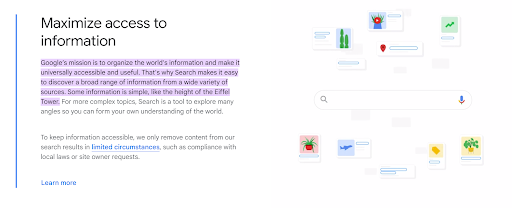
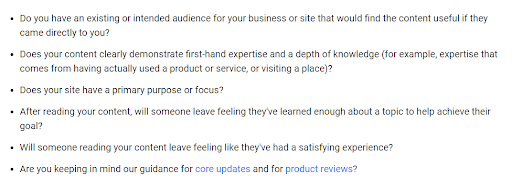
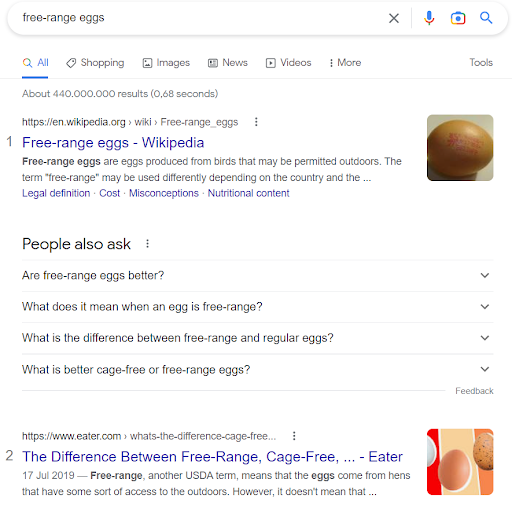
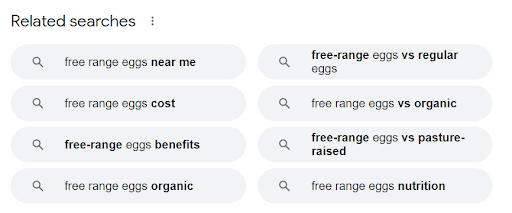
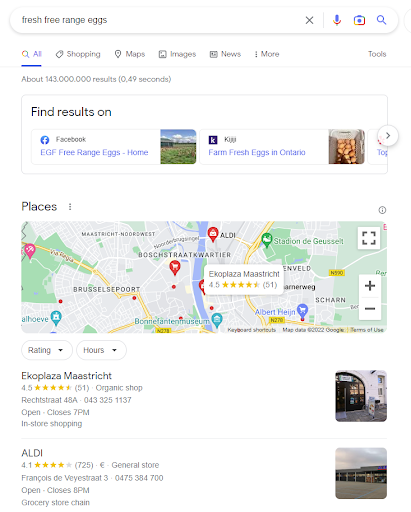


Hi David, What is the difference between topic clusters and duplicate content (vs Keyword cannibalization ) I love the related content in search, a great way to know what others are asking. I also use Google trends for that. Thanks David.
Hi Dave,
What a joy to be here again after a long gap!
Hope everything is well with you all 😃
What a timely share!
Yes. the need of the hour is to write well and in-depth contents to your readers.! I fully agree with one you mentioned in tips #4 yes, write clear, in-depth, easy-to-understand answers!
I also liked the old school telephone narration!
Indeed a well written/explained one. This really made my day to ponder over.
Thanks Dave for the share.
I am here via the curated piece on BizSugar.
Best Regards
~ Phil
Hi Poulomi & Dave,
What a valuable content piece you have here. We all want to rank higher on SERPs, and to do so, you must first write for humans. That’s because people will interact with your post and signal search engines that you offer value. The more signals search bots get, the higher your page will rank.
I also want to comment on Lisa’s question;
Topic clusters, also known as content clusters are groups of content that covers a broad topic. It is built on a pillar page and interlink to other subtopic pages on a subject area. For example, if you Google “ecommerce marketing best practices,” Google will show you the “People also ask” (PAS) section. You can develop “ecommerce marketing best practices” as your main topic, and use those questions in the PAS section to create content clusters or subtopics and interlink them to your main topic.
Duplicate content refers to similar or identical content that appears on multiple pages on your blog/site, or on other websites around the web.
Keyword cannibalization is when you have multiple pages on your site targeting the identical or similar keywords. It hurts your SEO because search engine bots will struggle to determine which content to rank higher.
Thank you for sharing these valuable tips, Poulomi, and for publishing the material, Dave!
Thanks a lot for the comments, everyone! Sorry for the late reply…didn’t get the notifications about the comments.
Moss, definitely agree with you. When people love your content, it will tell the search engines your post is valuable, and there is no better validation than that. Not even backlinks, in many cases.
Lisa, Moss answered your questions perfectly. I would just like to add, duplicate content can also appear when you unintentionally have two pages with the same content on your own website. Like one in HTTP and one in HTTPS. Then you have to add canonical URLs.
Sometimes if you have two posts ranking closely for the same keyword, you can also get indented SERPs. That is usually good as you get more exposure on Google, but you have to be careful that they don’t pull down the rankings of your posts.
Philip, thanks a lot for your comments too! The telephone example the best one I could think of, of translating human communication to machine language 😉 I am glad you enjoyed the post!